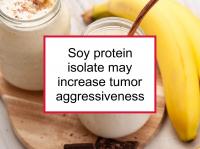A study designed to investigate mammary tumor progression in rats fed soy protein isolate has reported that this diet promoted PR expression and more aggressive tumors. Increased consumption of soy and soy isoflavones (genistein and daidzein) have been reported to reduce breast cancer risk in women and in animal models of breast cancer.
In one study, dietary intake of soy protein isolate in rats treated with a carcinogen to induce mammary tumors reduced tumor numbers but increased the number of more invasive tumors compared to rats on a control diet of milk protein (casein). The breast tissue of women consuming dietary soy supplements has been reported to have increased PR expression, whereas PR expression in the breast tissue of women on soy food-based diets has been found to be lowered.
In the current study, the authors evaluated whether mammary tumor progression in tumor-bearing rats exposed to soy protein isolate is associated with expression of progesterone receptor A (PR-A) and progesterone receptor B (PR-B).
PR-A levels were found to be higher in normal mammary glands in the soy protein isolate-fed rats than in the milk protein group, whereas PR-B levels did not differ according to diet. Increased mammary PR-A expression was found to be associated with more aggressive tumor characteristics. Progesterone levels were lower and estrogen (estradiol) levels were higher in the soy protein isolate-fed rats compared to the milk protein-fed rats.
The authors conclude that soy-rich diets may influence the development of more aggressive tumors by increasing expression of PR-A and enhancing PR-A-dependent signaling in premalignant breast tissues.
Please see our articles on soy protein isolate, soybeans, soybean oil, genistein and daidzein and tofu.
